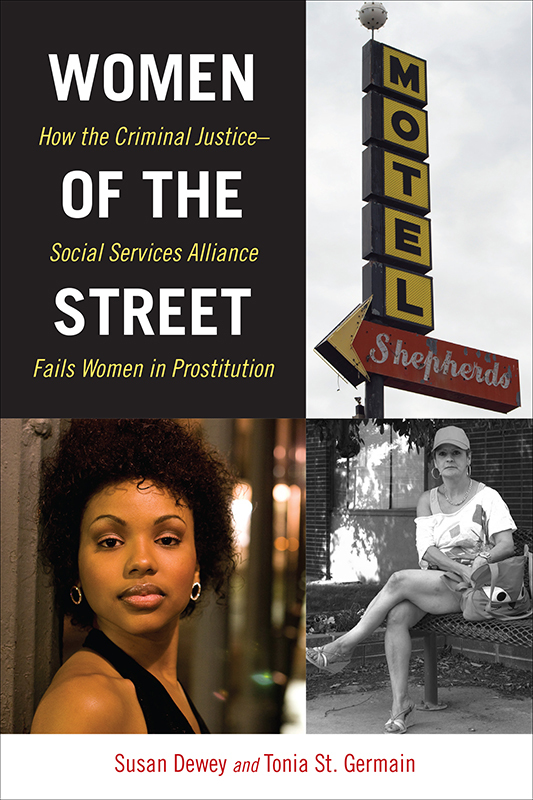
Women of the Street
Women of the Street
How the Criminal JusticeSocial Services Alliance Fails Women in Prostitution
Susan Dewey and Tonia St. Germain

NEW YORK UNIVERSITY PRESS
New York
NEW YORK UNIVERSITY PRESS
New York
www.nyupress.org
2016 by New York University
All rights reserved
References to Internet websites (URLs) were accurate at the time of writing. Neither the author nor New York University Press is responsible for URLs that may have expired or changed since the manuscript was prepared.
ISBN : 978-1-4798-5449-3 (hardback)
ISBN : 978-1-4798-4194-3 (paperback)
For Library of Congress Cataloging-in-Publication data, please contact the Library of Congress.
New York University Press books are printed on acid-free paper, and their binding materials are chosen for strength and durability. We strive to use environmentally responsible suppliers and materials to the greatest extent possible in publishing our books.
Manufactured in the United States of America
10 9 8 7 6 5 4 3 2 1
Also available as an ebook
Contents
On a freezing afternoon several years ago, Susan, this projects ethnographer, sat quietly on a motel room floor as she listened to a woman recount the series of events that led her to Denvers East Colfax Avenue, where many of the women in this book engage in street-based sex trading and other criminalized hustles while struggling with addiction, homelessness, and various forms of criminal justice system involvement. This encounter unfolded much like hundreds of others preceding and subsequent to it, except for the urgency and seriousness of the womans parting words as she stood in the doorway, pointing at Susan and narrowing her eyes for emphasis. Listen, sister, she intoned, her voice breaking slightly with emotion, now you better get out there and do somethin with what I just told you, because I was one hundred percent fuckin straight with you today about life out here, and I didnt have to be. Her words remained an ever-present admonishment in Susans mind whenever her commitment to this project wavered, and it is to her, and the many others who bravely shared their stories, that we dedicate this book.
After six years ethnographic and intellectual immersion in the lives of street-involved women and the social services and criminal justice system professionals with whom they regularly interact, we continue to be humbled by the candor, trust, and genuine human kindness participants in this project showed us. Most need to remain anonymous precisely because they disclosed profound uncertainties and other sensitive information about their quotidian income-generation activities that could have legal ramifications or negative professional repercussions. We remain extremely grateful to them for this trust, their time, and the honesty with which they spoke.
We are extraordinarily fortunate that this book benefited from NYU Press editor Jennifer Hammers acumen, faith in the project, and near-instant responses to our queries. Her vision, coupled with stellar insightful and constructively critical comments from five anonymous peer reviewers, shaped aspects of this book in ways that reflect abilities far greater than our own. We are likewise grateful to the University of Wyoming, which provided financial support for transcription, travel, and other research costs, and hosted Tonia for a year of incredibly precious in-person time for collaboration as part of the Gender & Womens Studies Program. University of Wyoming students and colleagues assisted tremendously with this project through transcription, coding, conversation, street outreach, and other generous gestures of support. We thank Mara Chopping, Kyria Brown, Rachel Surratt, Austin Morgan, Misty Heil, Josh Kronberg-Rasner, and Rhett Epler, as well as University of Wyoming Gender & Womens Studies colleagues Cathy Connolly, Bonnie Zare, Barbara Ellen Logan, Colleen Denney, and Wendy Perkins. Anthropologist Treena Orchard, with whom Susan worked closely on a U.S.-Canada comparative project that took place in conjunction with research for this book, provided insights that dramatically enriched Susans thinking about the issues street-involved women face throughout North America.
Anthropologists and legal scholars rarely work together (or even interact), and our many years of successful collaboration have continued to push our thinking in ever more interdisciplinary and productive directions. Susan will never be able to find words that adequately express her overwhelming gratitude to Tonia for her friendship, mentoring, and patience in spending countless hours explaining complex legal concepts and other facets of the criminal justice system that Susan previously regarded as mysterious, arcane, and beyond her grasp. Tonia is most grateful for the opportunity to augment Susans painstaking research, inspired writing, and overarching vision on this research project. Using her knowledge of the law to underscore Susans ethnographic process opened new ways of listening to women and analyzing the sociolegal problems and solutions that touch their lives. Our work together has fostered an experience of disciplined learning, independent thinking, and a beautiful friendshipa rare combination in academic undertakings.
This projects long-term and immersive nature presented some difficult emotional challenges for Susan, particularly as she took on an increasingly intensive professional role within the criminal justicesocial services alliance. Her support network of family and friends made this possible by emphasizing the importance of self-care in addition to empathic research and, later in this project, services provision. Susans husband, Rob, is an unfailing source of empathy and compassion, even though this work frequently receives more of her time, love, and emotional investment than he does. Her dearest friends, Barbara Ellen Logan and Ruth Bjorkenwall, unfailingly provided encouragement and insights in addition to saving Susans life on a regular basis by letting her stay with them when icy or otherwise treacherous mountain roads made travel home from work unsafe. Throughout the writing of this book, Susans retired police officer father, who spent a good portion of his career working undercover, patiently answered hundreds of her questions about police procedure. There are many, many others who helped this project along, and although they are too numerous to thank here, Susan hopes that they know how much their insights inform this book.
Through the thin polyester curtains shading the window of the dimly lit motel room, the red and blue flashing squad car lights illuminate the faces of NeNe and James in violent color. They stare at each other, frozen in the light, listening to the static hiss of male voices on the police radio outside, whispering the standard list of questions frenetically among themselves, their voices tense and accusatory as they anticipate the officers knock on the door. Is there dope in the room? Does anyone have a gun? Is the officer coming to arrest NeNe? Is he here for James? They each consider the answers and their implications in their own minds, collectively exhaling as the squad car pulls out of the motel parking lot. James, who is thirty-five and has spent the last seventeen years of his life in a Colorado prison following a drug deal gone very wrong, lies back on the bed and covers his face, still and quiet.
Outside, Officer Berman checks the time. He is exhausted, with only an hour left on his shift, and feels relieved not to have to make another arrest tonight. The ten-block stretch that comprises what police term a known prostitution area emptied as soon as he entered and found a woman with seven outstanding arrest warrants sitting at a bus stop, waiting for clients. She is now handcuffed in the back of his squad car, refusing to speak. He knows that out here she goes by Peaches, although the name on her lengthy criminal record is plain Mary Washington. Officer Berman is responsible for two of her twenty-six arrests on prostitution and drug paraphernalia charges. Tears glisten on her cheeks, her wig slightly askew, and Officer Berman feels sorry for her as he thinks about his daughter, who is about the same age and attending community college with plans to become a nurse.
Next page






